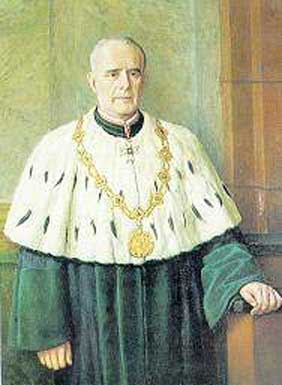|

Walery Goetel
in the robes of the Rector of the Academy of Mining and Metallurgy
|
Walery Goetel (1889-1972), a geologist and ecologist, is recognized as having been one of the persons most responsible for the creation of the Tatras National Park.
Born in 1889 in Sucha Beskidzka, he attended a renown gymnasium (Nowodworskiego high school) in Kraków and went on to obtain a degree in philosophy from the Jagiellonian University. In 1913 he received a doctorate in geology and paleontology from the University of Wilno for his studies of the geology of the Tatra Mountains. An avid mountaineer, and in the years 1907-1914 was the first to scale a number of difficult faces and to open an number of new routes in the Tatras.
With Poland regaining independence in 1919, the question of the location of its borders became a pressing one. Goetel became the Secretary of the Committee for the Defence of Spisz, Orawa, and Podhale and, in 1919-1920, directed the work of the Polish Spisz and Orawa Plebiscite Committee, becoming in the years 1921 -1924 the plenipotentiary of the Polish government in negotiations with the Czechoslovakia regarding the location of the international border in the Tatras, Orawa and Spisz.
After receiving his doctorate he worked at the Jagiellonian University and, from 1920, at the Academy of Mining and Metallurgy, Kraków's renown Technical University where he set up a department of Geology and Paleontology. Rising to the rank of full professor he was chosen in 1939 to be the Rector (President) of the Academy.
He was away visiting Lwów (Lviv) when on November 6, 1939, the Gestapo invited the professors of the Jagiellonian University and the Academy to a meeting at which they arrested all 183 professors in attendance and sent them to a concentration camp. Following his return to Kraków, the Germans permitted a technical mining and metallurgy training school to be set up, because of their need of trained personnel. Goetel headed the school and arrange for the students to concurrently have clandestine courses leading towards degrees in engineering. After the war, he was restored as Rector of the Academy, a position he held until 1951.
An enthusiastic competitor in field and track, rowing and skiing, he was also a skiing instructor and an activist in the field of conservation. He was particularly involved in seeking to prevent commercial development in the High Tatras, fearing that, though majestic, these mountains represented a fragile alpine ecosystem. To preserve the pristine mountain environment the PTT (Polskie Towarzystwo Tatrzanskie, the Polish Tatra Association) advocated , starting right after the end of WWI and with much energy, the creation of a Tatras National Park. Every issue of the Associations newsletter Wierchy, which Goetel edited through 1937, reported on the course of the battle. The arguments always followed the same script:
- What you are seeking is that no one should climb the Tatras,
- What I want is that there be something worth climbing them for.
There is but one cable car operating in the Polish Tatras. It begun operations on February 25, 1936. It rises from Zakopane to a peak by the name of Kasprowy Wierch. It's construction was begun on July 28, 1935. The work was initiated without asking the owners of the land for permission, purportedly because the Vice-Minister of Transportation was the son-in-law of Poland's President, Ignacy Moscicki. In November of that year, Walery Goetel wrote "The forests were cut, and the area was recklessly and ruthlessly devastated."
As president of the PTT in the periods 1919-1921 and 1936-1947 and the 1939 president of Poland's High-altitude Mountaineering Club, Goetel continued to press for creation of the Tatra National Park. It was established eventually on January 1, 1955 with over half its area becoming a nature preserve; Goetel is credited with being one of its creators. Today, with designated paths channeling the flow through the park of the over 3.5 million annual visitors, the beauty of the mountains is preserved for all to see. On the day that the Tatra National Park was created, so also the Pieniny Mountains and the Babia Góra National Parks came into being and, in each instance, their existance is associated with Goetel's name.
Goetel's motto was Widzieć - Chcieć - Działać which can be rendered as "To see - To wish - To act." It is the title of the first chapter of a posthumously published book Goetel wrote with the title Man against himself? Earlier, in 1965, he introduced into Polish scientific terminology the term "sozology" meaning the protection of the natural human environment. To-day there is a rich literature on the subject, the term being used more and more frequently to define sciences concerned with protection of the environment. Goetel died in 1972.
|

